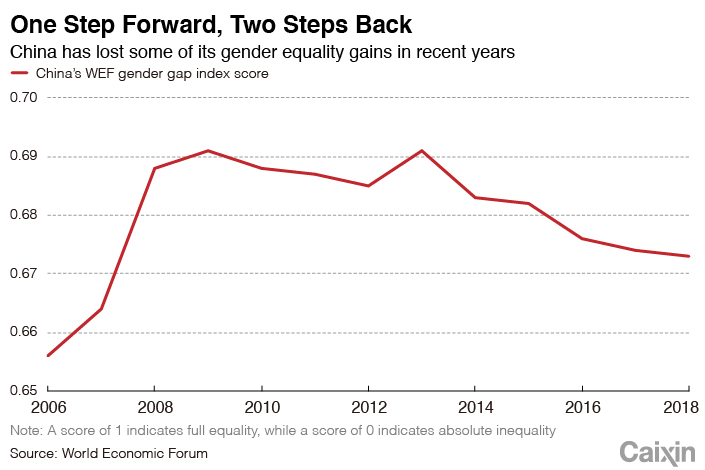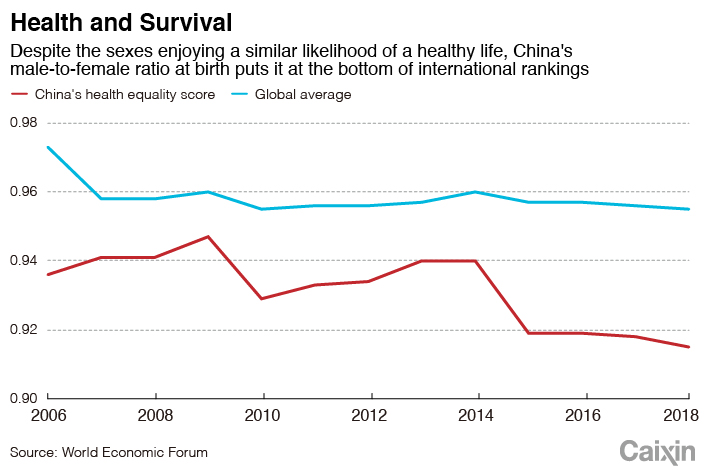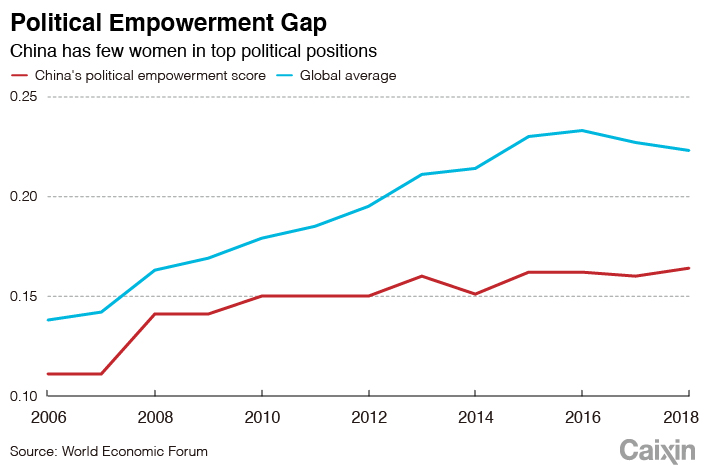Source: Caixin (12/19/18)
Why China is Getting Worse for Women
By Teng Jing Xuan

China is becoming a more unequal place for women, a new report says.
The nation ranks 103rd out of 149 countries for gender equality, slipping from last year’s 100 out of 144, according to an annual report published by the World Economic Forum (WEF) on Friday.
That puts China behind Myanmar, Romania and Russia.
This marks the fifth year in a row that China’s Gender Gap Index score has fallen. The index measures women’s opportunities in politics, education, health and the economy.
A major driver of the growing gender gap has been a widening disparity between men’s and women’s economic participation. While nearly 70% of countries have narrowed the economic gender gap in the past 10 years, China’s gap actually widened over the same period, a WEF spokesperson told Caixin.
China’s economic participation score has been falling steadily since a high of 0.696 in 2009, WEF figures show. This year it is 0.653. A figure of 1.0 means perfect equality, while zero means complete inequality.
“This is a worrying sign as it means China’s talent pipeline isn’t being optimized, which will have an impact on future economic competitiveness, particularly when China does have high levels of women’s education,” the spokesperson said.

Narrowing the economic gender gap is especially important in “high-growth areas such as AI and computing,” as “these will become ever more prevalent in all industries in the future. Thus, gender inequalities here have the potential to reinforce inequalities in the future if they are not tackled urgently,” the spokesperson said.
Chinese women lag the furthest behind men in the political arena, where the vanishing number of women in the National People’s Congress and State Council — the Chinese parliament and cabinet respectively — put the country’s political empowerment gap at 83.6%.
Women remain drastically underrepresented in politics all around the world. Given current trends, it will take 107 years to close the global political empowerment gap, according to the report.

And while China, like most other countries, has nearly perfect equality in terms of health care, far more boys than girls are born each year. This serious gender imbalance at birth puts it at the bottom of the WEF’s rankings in terms of women’s health and survival.
Because of the similar chances of males and females being born, a low recorded female population at birth suggests that large numbers of women may be “missing” in a country due to factors like sex-selective abortion, or parents’ unwillingness to register or report their daughters’ births — a known issue in China under its now-defunct one-child rule.
China is one of only four countries in the world where the share of girls at birth is below 91%. The others are India, Azerbaijan and Armenia. The natural ratio is 94.4%, which is also the ratio in 113 countries.
The government and businesses “both have a clear role to play in accelerating progress,” the WEF spokesperson said.
“One thing that is clear is that proactive action — in the form of clear and achievable policy prescriptions — is needed to address the gender gap. Otherwise, history has shown that inertia will set in.”
Contact reporter Teng Jing Xuan (jingxuanteng@caixin.com)